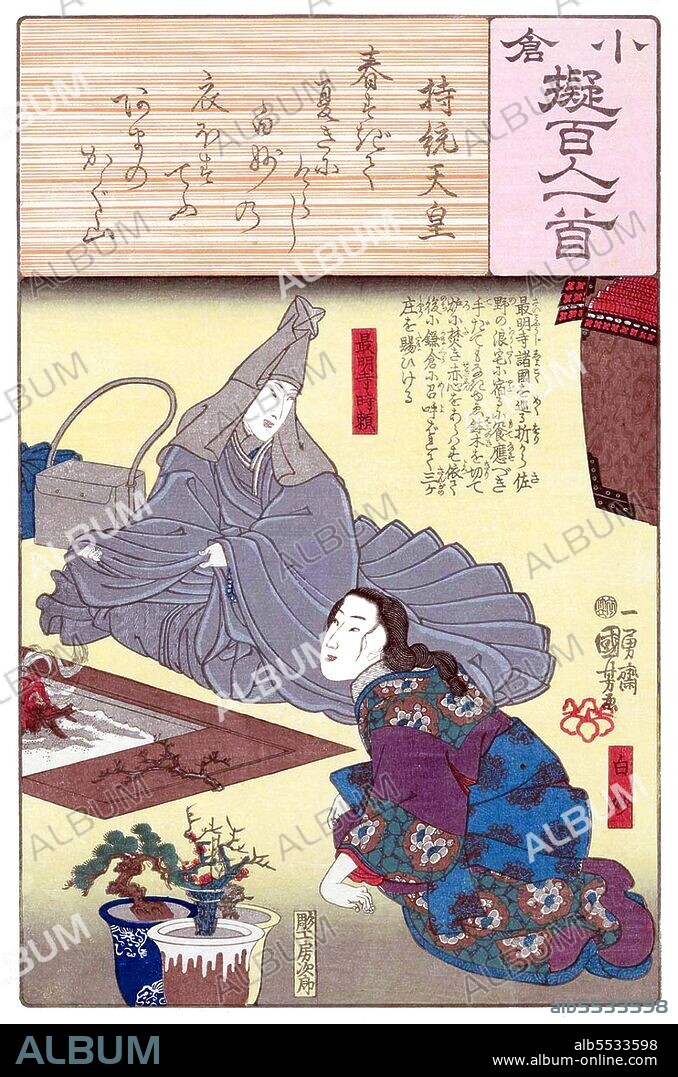alb5533598
Japan: A monk discoursing with a woman beneath a poem by Empress Jito (645 – 703). From an untitled series of 'One Hundred Poems by One Hundred Poets', Fujiwara no Teika (1162-1214). Utagawa Kunisada (1786-1865), c. 1847

|
Add to another lightbox |
|
Add to another lightbox |



Buy this image.
Select the use:

Title:
Japan: A monk discoursing with a woman beneath a poem by Empress Jito (645 – 703). From an untitled series of 'One Hundred Poems by One Hundred Poets', Fujiwara no Teika (1162-1214). Utagawa Kunisada (1786-1865), c. 1847
Caption:
Empress Jito (???? Jito-tenno, 645 – 13 January 703) was the 41st monarch of Japan, according to the traditional order of succession. Jito's reign spanned the years from 686 through 697. In the history of Japan, Jito was the third of eight women to take on the role of empress regnant. The two female monarchs before Jito were (1) Suiko and (2) Kogyoku/Saimei. The five women sovereigns reigning after Jito were (3) Gemmei, (4) Gensho, (5) Koken/Shotoku, (6) Meisho, and (7) Go-Sakuramachi. Jito took responsibility for court administration after the death of her husband, Emperor Temmu, who was also her uncle. She acceded to the throne in 687 in order to ensure the eventual succession of her son, Kusakabe-shinno. Throughout this period, Empress Jito ruled from the Fujiwara Palace in Yamato. Prince Kusabake was named as crown prince to succeed Jito, but he died at a young age. Kusabake's son, Karu-no-o, was then named as Jito's successor. He eventually would become known as Emperor Mommu. In 697, Jito abdicated in Mommu's favor; and as a retired sovereign, she took the post-reign title daijo-tenno. After this, her imperial successors who retired took the same title after abdication. The actual site of Jito's grave is known. This empress is traditionally venerated at a memorial Shinto shrine (misasagi) at Nara. The Imperial Household Agency designates this location as Jito's mausoleum. It is formally named Ochi-no-Okanoe no misasagi.
Credit:
Album / Pictures From History/Universal Images Group
Releases:
Image size:
3346 x 5055 px | 48.4 MB
Print size:
28.3 x 42.8 cm | 11.2 x 16.9 in (300 dpi)
Keywords:
ART • ARTS • ASIA PICTURES • ASIA • ASIAN IMAGE • ASIAN IMAGES • ASIAN PICTURES • ASIAN • EMPRESS JITO • EMPRESS • FEMALES • FUJIWARA NO TEIKA • HISTORIA UNIVERSAL • HISTORIA • HISTORICAL IMAGES • HISTORICAL PICTURES • HISTORICAL • HISTORY IMAGES • HISTORY PICTURES • HISTORY • HISTORY. • JAPAN • JAPANESE EMPERORS • JAPANESE • JITO TENNO • KUNISADA, UTAGAWA • LEGEND • LYRIC POETRY • LYRIC • MONARCH • MONARCHY • MUJER • MUJERES • PAINT • PAINTING • PAINTINGS • POEM • POESIA • POESY • POET • POETRY • POETS • QUEEN • QUEENS • ROYALTY • RULER (POLITICAL) • RULER • RULERS • SOVEREIGN (RULER) • SOVEREIGN • UKIYO-E • UTAGAWA KUNISADA • WOMAN WOMEN • WOMAN'S • WOMAN • WOMAN. • WOMANS • WOMEN IN HISTORY • WOMEN'S • WOMEN • WOMENS • WOODBLOCK PRINT • WOODBLOCK • WOODCARVING • WOODCUT • XYLOGRAPHY


 Pinterest
Pinterest Twitter
Twitter Facebook
Facebook Copy link
Copy link Email
Email
